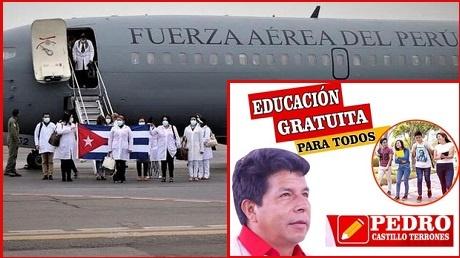Cuban influence in leftist candidate for the presidency of Peru.
Maria Werlau, founder of the Cuba Archive at Georgetown University, has warned Peruvians about Cuban interference in the program of Pedro Castillo, leftist candidate of the Peru Libre party for the second round of elections in the South American country, to be held on June 6.
In an interview with the site Perú 21, the Cuban-American intellectual, author of the volume La intervención de Cuba en Venezuela: Una ocupación estratégica con implicaciones globales, points out that "the evidence of Cuba's penetration in Peru is solid" and has been documented since the early days of Fidel Castro's revolution.
"We know how Cuba operates and how it has exported this model throughout the region for more than six decades. This is not new; they are experts in mass mobilization", he points out, and adds that the regime's attempt to take the model to other countries in the area has never been stopped, it has only adopted other forms, by way of "make-up to the obvious armed subversion".
On this aspect, he cites two of the "conquests" that Havana has most often wielded to try to sell the benefits of the system: free health and free education, both in Castillo's electoral program.
"Free education is one of the bastions of the populist movement. A socialist government promises the population to educate everyone for free. Education is key for them. Besides, it is a strategic sector, because it is a source of early indoctrination of the population", Werlau stressed.
To exemplify this, he alludes to the case of Venezuela -which after the rise of Hugo Chávez received early support from Fidel Castro's government with the "educational missions": "The methodology of using education is fundamental for Cuba. As it is a multi-generational and long-term plan, therefore, they are obliged to 'educate' the little ones".
Werlau also casts doubts on the free nature of education, since the State charges for it later: "They pay for it with their freedom. Then they have to work for the state for the rest of their lives. From very early on, in the Cuban revolution, education is very important to subordinate people to the ideology they want to impose".
Education is precisely one of the ways in which the Cuban regime recruits people. The expert recalls that Vladimir Cerrón, ideologue of Castillo's party, graduated as a doctor in Cuba, where he lived for a long period.
"Cuba educates students from other countries with the express intention of recruiting agents who are not necessarily officers. Those people feel they owe education or health to Cuba. The idea of educating these people is to insert them into the political and administrative system of the country, so that they will interfere in favor of Cuba," he explained.
The Peruvian newspaper was also interested in the underlying intentions of the island's medical brigades abroad, one of which arrived in Peru in 2020 to face COVID-19.
In this regard, Werlau pointed out that Havana took advantage of the health emergency to "sneak in a brigade, skipping all the country's requirements to receive certified medical personnel. It is not known if these people are actually trained doctors and, in many cases, they are not.
In his opinion, this personnel serves as a propaganda tool for the regime and is "a very important captive mass, which is used as an army, as happened in Venezuela", where Castro and Chavez introduced tens of thousands of Cubans.
That of health professionals "is a very important and brilliant political weapon -he assures-. Besides, if you give away health, people will be loyal to the revolution. It is an army trained to say that health work is the work of communism".
When asked what the assumption of Castillo's government would imply for a health system as deficient as the Peruvian one, the Cuban-American researcher referred to the scheme that Cuba has already implemented in other countries.
"Many times these doctors go to underprivileged populations that do not know what a good doctor is. Therefore, they can send them poorly trained or recently graduated doctors. They give them a service they didn't have and they give it to them for free, but when the system collapses, the government has already instituted totalitarian control," he explained.
"In Cuba the health system is a disaster, and that will come to Peru eventually if they adopt that model," he warns. What happens is that it takes many years and they live on the story of promises. The initial promises will be health for all and education for all. But then they will have Venezuela or Cuba, which is what this system unfortunately brings".
María Werlau is the daughter of Armando Cañizares Gamboa, a fighter with Che Guevara's troops in the Sierra Maestra, who emigrated to Miami after learning that he was being tracked by Castro's authorities for his activism in the opposition movement that began to take shape early on.
Cañizares returned to Cuba as a member of Brigade 2506 and disappeared on April 21, 1961. Neither his widow nor his daughter ever heard from him again.


